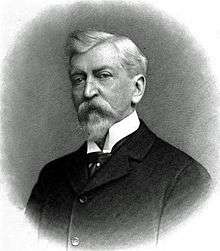William E. Cameron
William Evelyn Cameron (November 29, 1842 – January 25, 1927) was an American soldier, lawyer, journalist, and politician. He served as the 39th Governor of Virginia from 1882–1886, elected as the candidate of the Readjuster Party headed by William Mahone.[1]
William Evelyn Cameron | |
|---|---|
 | |
| 39th Governor of Virginia | |
| In office January 1, 1882 – January 1, 1886 | |
| Lieutenant | John F. Lewis |
| Preceded by | Frederick W. M. Holliday |
| Succeeded by | Fitzhugh Lee |
| Personal details | |
| Born | November 29, 1842 Petersburg, Virginia, USA |
| Died | January 25, 1927 (aged 84) Louisa County, Virginia, USA |
| Political party | Readjuster Democratic |
| Spouse(s) | Louisa Cameron |
| Profession | Politician, Lawyer |
| Military service | |
| Allegiance | Confederate States of America |
Early life and career
William Evelyn Cameron was born in Petersburg, Virginia. His parents were Walker Anderson Cameron and Elizabeth Page Walker. He attended local schools, then the North Carolina Military Institute in Hillsboro, North Carolina.
Cameron briefly attended Washington College in St. Louis, Missouri. He received an appointment to the United States Military Academy at West Point, New York.
American Civil War
When the American Civil War started, Cameron abandoned his preparatory studies and joined the Confederate Army, serving throughout the war.
Marriage and family
After the war, Cameron returned to Petersburg, where he married Louisa Clarinda Egerton (1846–1908) on October 1, 1868. They had three children.
Career
Cameron read the law and passed the bar. He started to practice law, but decided to pursue a career in journalism. He was an editor for newspapers in Petersburg, Norfolk and Richmond, Virginia.
Hughes duel
In 1869, Cameron fought a duel with Robert William Hughes, after Cameron criticized Hughes in print for the opportunism: he had changed his political views from pre-war Secessionist to post-war Republican. According to the writer Frank Mott,
[T]he parties met at Chester Station, on the Petersburg Railroad; but, before they could exchange a shot, the police made their appearance, and caused a flight of the parties. They passed into North Carolina, where they fought on the 12th of June with pistols. Cameron was hit in the breast at the first fire, the ball striking a rib and glancing. Hughes demanded another fire, but the surgeons declared that Cameron could not deliver another shot, and the affair ended 'to the satisfaction of all parties.'[2]
Political career
Cameron became active in the Readjuster Party. He was elected as mayor of Petersburg, serving from 1876 to 1882.
In 1881, he was the gubernatorial candidate of the Readjuster Party and elected governor with biracial support defeating John Warwick Daniel (who represented the state Funder faction, a group who wanted to pay the debt and its interest in whole) by nearly 6% of the vote. During his term from 1882–1886, he attempted to implement his party's programs of debt reduction and racial integration in certain areas. In 1882 it led passage of legislation for a land-grant college for blacks, what is now Virginia State University in Ettrick, near Petersburg.
On February 17, 1882, Cameron personally led a successful anti-oyster pirate expedition of two boats and armed state militia in the ongoing Oyster Wars of the Chesapeake Bay, capturing seven ships. The state had attempted to license and control traffic in the popular seafood, but 5,800 Virginia oyster boats often disregarded laws related to trying to preserve the harvest.[3] An attempt at a repeat raid the next year ended in Cameron's steamships unsuccessfully racing the "laughing lasses" of the pirate sailboat Dancing Molly.[4] His embarrassment was compounded by fact that none of the alleged pirates captured in the second raid were convicted, but Cameron persevered and helped form the Board on the Chesapeake and its Tributaries to enforce oyster law.[3]
After his term as governor ended in 1886, Cameron briefly left Virginia. He returned and resumed a career in politics, but as a conservative Democrat. Cameron represented Petersburg in the Virginia Constitutional Convention of 1901–1902. At this time, the Democrat-dominated legislature created a disfranchising constitution and essentially ended black voting. The Republican Party, which had made a brief and small comeback after the collapse of the Readjusters, ceased to be competitive in the state.
Cameron served as editor of the Norfolk Virginian-Pilot newspaper from 1906 to 1919.
William Evelyn Cameron died on January 25, 1927 at the home of one of his sons in Louisa County, Virginia. He was buried at Blandford Cemetery in Petersburg.
Notes and references
- Tice Moore, James. "William Evelyn Cameron (1842–1927)". Encyclopedia Virginia. Retrieved 13 July 2015.
- Mott, Frank (2000). American Journalism: A History of Newspapers in the United States Through 250 Years, 1690–1940. Routledge (accessed via Google Books). ISBN 0-415-24144-8.
- Moore, James Tice (July 1982). "Gunfire on the Chesapeake: Governor Cameron and the Oyster Pirates, 1882–1885". The Virginia Magazine of History and Biography. 90 (3): 367. JSTOR 4248570.
- Goodall, Jamie L. H. (24 February 2020). Pirates of the Chesapeake Bay : From the Colonial Era to the Oyster Wars (Paperback ed.). History Press US. pp. 118–119. ISBN 146714116X.
External links
- "A Guide to the Executive Papers of Governor William E. Cameron, 1882–1885", The Library of Virginia
| Party political offices | ||
|---|---|---|
| First | Readjuster nominee for Governor of Virginia 1881 |
Succeeded by None |
| Political offices | ||
| Preceded by Frederick W. M. Holliday |
Governor of Virginia 1882–1886 |
Succeeded by Fitzhugh Lee |
